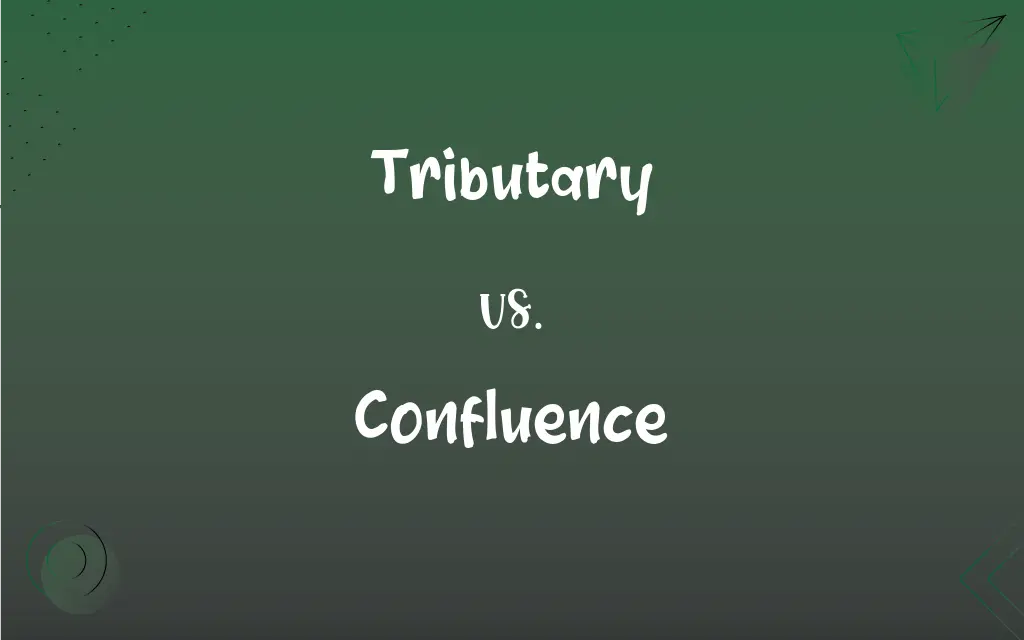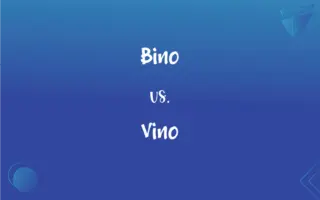Tributary vs. Confluence: What's the Difference?
Edited by Aimie Carlson || By Janet White || Updated on November 10, 2023
A tributary is a stream or river that flows into a larger one, while a confluence is the point where two or more bodies of water meet and merge.

Key Differences
A tributary contributes water to a larger stream or river, augmenting its flow. Confluence denotes the location where two or more rivers converge, blending their waters.
Tributaries are smaller watercourses that increase the volume of the main river. A confluence is a geographic point, often significant for ecological and geographical reasons.
In hydrology, tributaries are integral to a river system, impacting its size and course. Confluences, on the other hand, are notable for the mixing of different water streams, sometimes with distinct characteristics.
Tributaries can originate from various sources like springs or other rivers. Confluences can create unique features like deltas or wetlands, depending on the terrain and water volume.
The term tributary also symbolizes a subsidiary or dependent element. In contrast, a confluence can metaphorically represent the coming together of ideas, cultures, or forces.
ADVERTISEMENT
Comparison Chart
Definition
Stream/river flowing into a larger one
Point where two or more waters meet
Role in River System
Contributes water to main river
Merging point of water bodies
Geographic Significance
Part of larger river's path
Notable point of convergence
Source and Formation
Originates from springs, other rivers
Formed by the meeting of rivers
Symbolic Meaning
Subsidiary, dependent part
Meeting or merging of elements
ADVERTISEMENT
Tributary and Confluence Definitions
Tributary
A smaller watercourse contributing to a larger one.
Several tributaries feed into the Amazon River.
Confluence
The junction where two rivers meet.
The confluence of the Ganges and Yamuna is sacred in India.
Tributary
Any secondary stream that adds water and sediments to the main river.
The river swelled with water from its tributaries.
Confluence
Metaphorically, a meeting or blending of different elements.
The festival was a confluence of diverse cultures.
Tributary
A river or stream flowing into a larger river.
The Missouri River is a major tributary of the Mississippi River.
Confluence
A point of merging for multiple water bodies.
The confluence created a vast wetland area.
Tributary
A subsidiary stream joining a more significant stream.
The tributary winds through the valley before joining the river.
Confluence
The union of different streams forming a larger river.
The city is located at the confluence of two major rivers.
Tributary
Part of a river system feeding into a larger water body.
This tributary is crucial for the river's ecosystem.
Confluence
A geographic point significant for hydrology and ecology.
The confluence here is known for its unique fish species.
Tributary
A stream that flows into a larger stream or other body of water.
Confluence
A flowing together of two or more rivers or streams.
Tributary
A ruler or nation that pays tribute.
Confluence
The point of juncture of such rivers or streams.
Tributary
Making additions or yielding supplies; contributory.
Confluence
The combined river or stream formed by this juncture.
Tributary
Paid in tribute.
Confluence
A gathering, flowing, or meeting together at one juncture or point
"A confluence of negative events conspired to bring down bond prices" (Michael Gonzalez).
FAQs
Do tributaries only carry water?
Primarily, but they can also carry sediment and pollutants.
Do all rivers have tributaries?
Most rivers do, but some in arid regions may not.
Are tributaries important for ecosystems?
Yes, they support diverse ecosystems and contribute to the water cycle.
Can tributaries have their own tributaries?
Yes, smaller streams can feed into larger tributaries.
What is a tributary?
A tributary is a river or stream flowing into a larger river or lake.
Can a tributary be man-made?
Yes, tributaries can be natural or man-made.
How does a tributary differ from a river?
A tributary is smaller and feeds into a larger river, whereas a river is a primary watercourse.
How do tributaries affect river navigation?
They can increase the river's volume and change its navigability.
Can tributaries be seasonal?
Yes, some flow only during certain seasons or after rain.
Is confluence only a natural phenomenon?
Primarily, but human activity can create or alter confluences.
Can a confluence create a new ecosystem?
Yes, it can lead to unique ecological environments.
Can confluences cause flooding?
Yes, especially if the merging waters have high volumes.
Are confluences navigable?
This depends on the depth and flow at the merging point.
How is a confluence significant culturally?
Many cultures consider confluences sacred or significant for gatherings.
How does urbanization affect confluences?
It can alter water flow and quality, impacting the confluence.
Are tributaries protected by environmental laws?
Often, they are protected to preserve water quality and ecosystems.
Does a confluence affect water quality?
Yes, it can change the temperature, clarity, and chemistry of the water.
What is a confluence?
A confluence is where two or more bodies of water meet and merge.
Can a confluence occur with seas or oceans?
Rarely, as it typically involves rivers, streams, or lakes.
Do confluences attract tourism?
Yes, many are scenic and attract sightseers and adventurers.
About Author
Written by
Janet WhiteJanet White has been an esteemed writer and blogger for Difference Wiki. Holding a Master's degree in Science and Medical Journalism from the prestigious Boston University, she has consistently demonstrated her expertise and passion for her field. When she's not immersed in her work, Janet relishes her time exercising, delving into a good book, and cherishing moments with friends and family.
Edited by
Aimie CarlsonAimie Carlson, holding a master's degree in English literature, is a fervent English language enthusiast. She lends her writing talents to Difference Wiki, a prominent website that specializes in comparisons, offering readers insightful analyses that both captivate and inform.































































